'It can impact anyone': Experts, community members discuss need for affordable housing
After a family medical emergency left James Lawrence and his wife needing to care for loved ones, the couple had to survive on one income and eventually ran out of savings.
The couple and their children had to move in with his wife’s mother to get back on their feet.
“The housing situation, with the lack of affordable housing, can impact anyone, and it can impact anyone in a variety of ways,” said Lawrence, who spoke Wednesday night at "Finding Home," a storytelling and educational event hosted by The Arizona Republic at Tempe Center for the Arts.
Lawrence's family moved into an apartment in Phoenix, but quickly found it to be unsafe, he said. When he heard about Native American Connections’ sliding scale for renters to access housing, he and his wife were finally able to get their children into a safe, affordable apartment in downtown Phoenix.
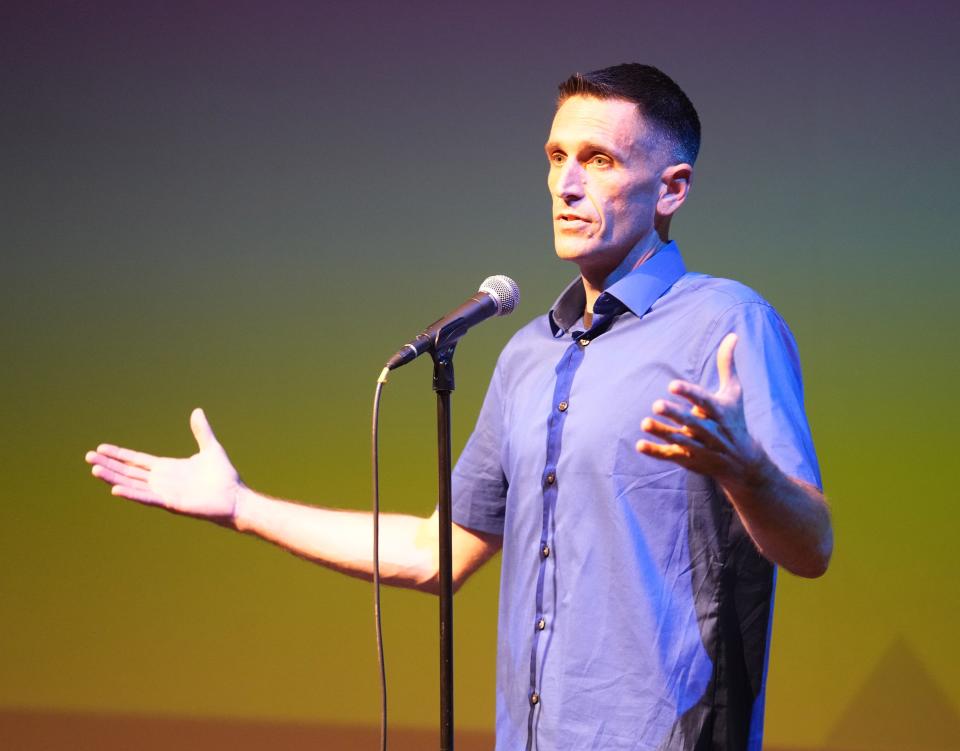
An apartment they could afford allowed them to support his wife’s siblings, who became displaced when their mother passed away.
“Having affordable housing put us in a place to be a support system for others, rather than being the ones needing support,” he said.
Lawrence was one of several speakers at an event, which The Arizona Republic sponsored alongside the Arizona Community Foundation, Arizona State University’s Morrison Institute for Public Policy, KJZZ and the City of Tempe. Hundreds of community members and leaders gathered to hear storytellers and experts share their experiences and ideas about addressing Arizona’s housing crisis.
Short hundreds of thousands of units
Across the state, there is simply not enough housing. An additional 270,000 housing units are needed across the state to meet demand, said Ashlee Tziganuk, a Morrison Institute research analyst.
A person is considered housing cost-burdened if they spend more than a third of their income on housing. Someone working full-time, earning Arizona’s minimum wage of $12.80 per hour could afford to pay $660 per month in rent before being cost-burdened, Tziganuk said. Average rent in Phoenix reached $1,477 in October 2021, according to Morrison Institute data.
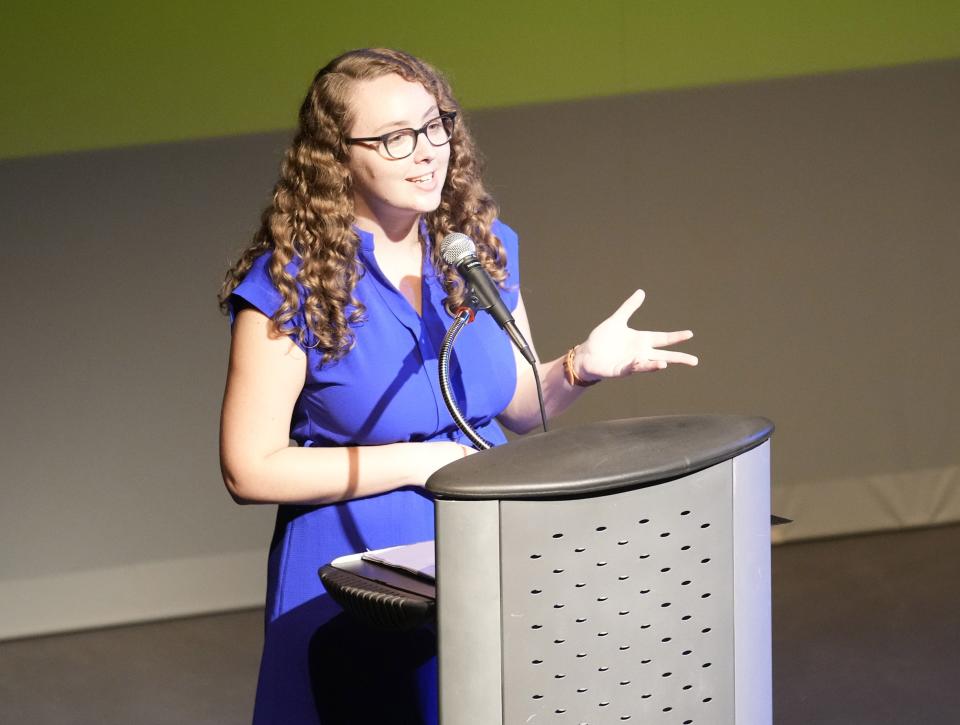
“The reality is people are very much struggling on a personal level,” she said, adding that renters are much more likely to be cost-burdened than homeowners.
In Maricopa County, about 44% of renters are cost-burdened, compared with 20% of homeowners, Tziganuk said.
Racial disparity an acute issue
Black, Latino and Native American people are much less likely to own their home than white people, according to Morrison Institute data, meaning they are more likely to rent and more likely to be cost-burdened by housing.
This reality is the result of decades of discriminatory housing and lending practices that have stacked the homeownership deck against racial minorities, said ASU professor Rashad Shabazz.
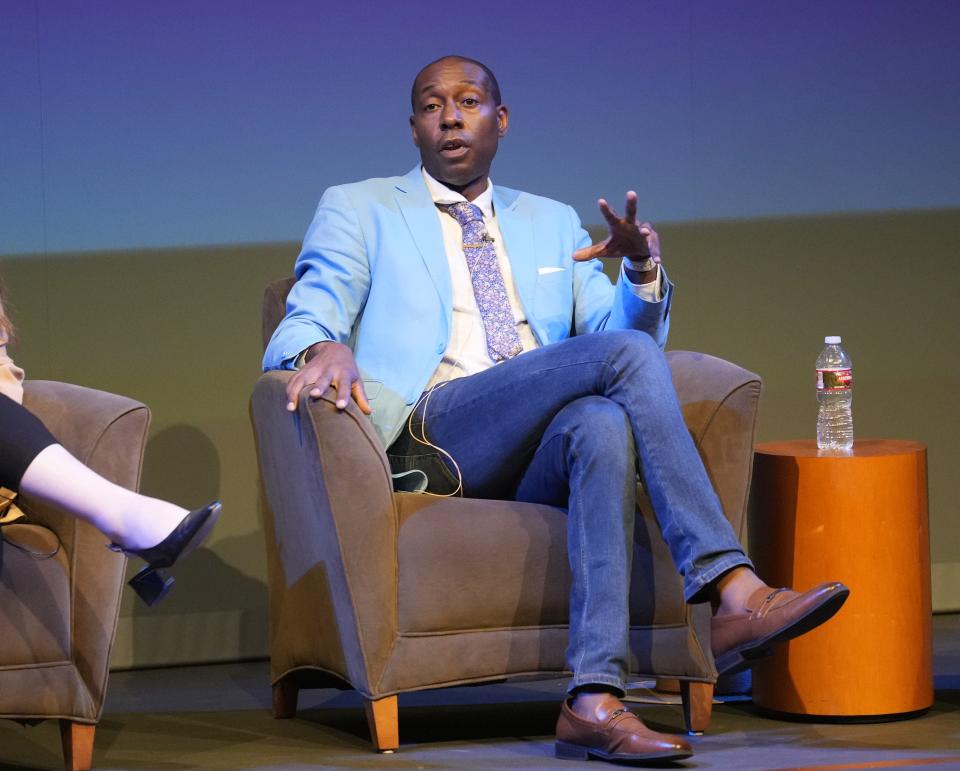
Shabazz was a member of a panel of housing experts moderated by Arizona Republic housing reporter Catherine Reagor.
The housing market was constructed to serve upper- and middle-class white homebuyers, Shabazz said. Early mortgage lending was limited to white borrowers, allowing white families to accumulate wealth through homeownership for generations. The same opportunity was not accessible to people of color, he said.
Allowing housing to be dictated by market-force development has also led to scarcity and a dramatic increase in costs, Shabazz said, creating the acute need for affordable housing that is being felt across the country.
“These two fundamental flaws were always going to lead us to this point,” he said. “This is not an aberration. Until we deal with these, we are always going to have this problem."
Evanston, Illinois, took steps to give housing market access to people who have historically been kept out, Shabazz said. That community is offering down payment assistance and subsidized mortgages. It's a reparations model, he said, that could be replicated on a national scale and give millions of people access to homeownership and allow them to build generational wealth.
Exclusionary practices still exist
Discrimination in housing is not limited to homeownership, said Sarah Shambrook, government relations associate for affordable housing developer Dominium.
When the company applies to rezone land to build affordable apartments, they are often met with opposition from neighbors worried about decreased property values, increased crime and traffic and added burden on schools. The opposition to new development in a neighborhood, known as NIMBYism (Not In My Backyard), can make it difficult for city councils to approve affordable developments.
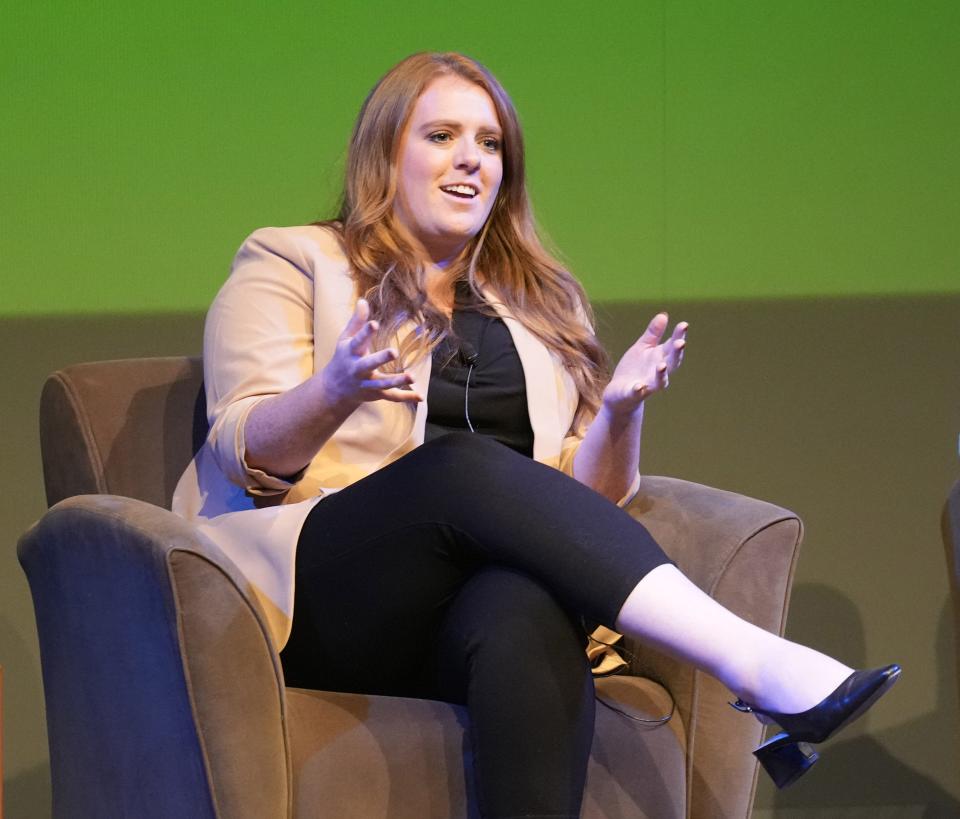
“NIMBYism is a modern-day form of redlining,” Shambrook said, adding that when developers apply to get a property rezoned, they must either prove there is enough existing infrastructure to support the project or pay for improvements, like roads and traffic signals.
Research has also disproven the notion that developing apartments near a residential neighborhood does not decrease property values, she said.
Shambrook urged event attendees to be aware of the NIMBY “buzz phrases,” like "property values," that can be used to rally a community against affordable housing. She wants people to recognize the euphemisms meant to keep affordable housing and those who need it out of neighborhoods.
Can those who serve a community live there?
Joan Serviss, executive director of the Arizona Housing Coalition, said wages in Arizona simply are not keeping up with rent and mortgage increases, forcing more people across the state to become unsheltered. Serviss said there were more than 13,000 people across Arizona who were unsheltered during the latest census of people experiencing homelessness.
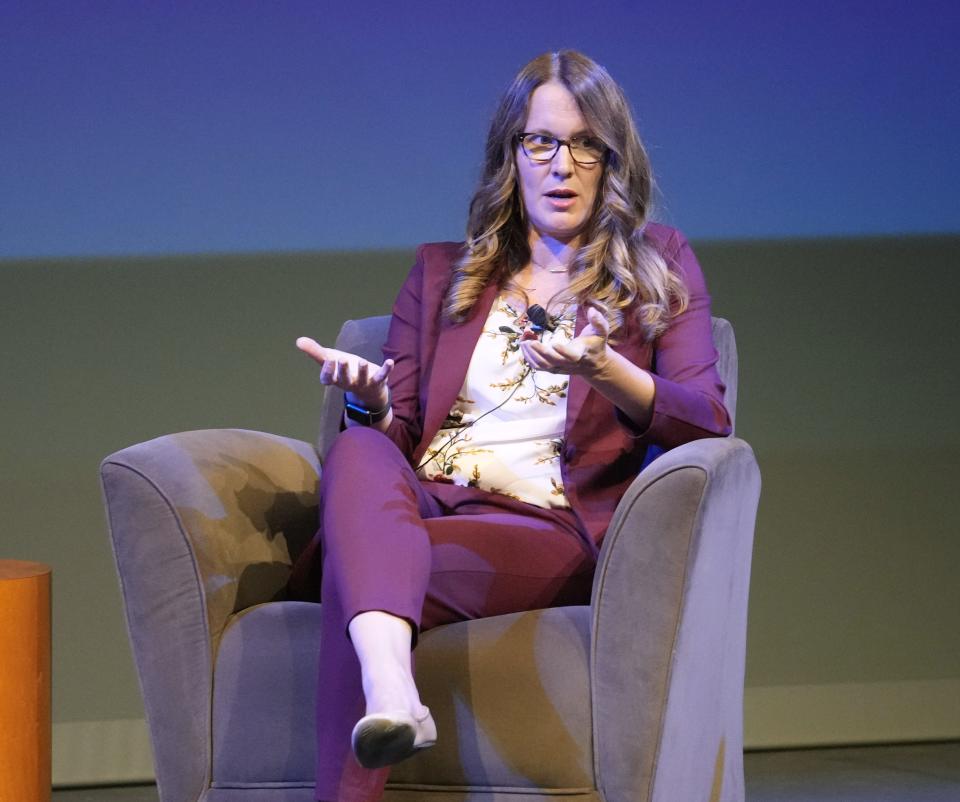
People often have an unflattering idea of what affordable housing is, she said. Modifying the messaging to focus on people who are already working in a community but cannot afford to live there could help change the perception of who needs affordable housing, she said. Restaurant employees and educators are among the people being priced out of living in the communities where they work, she said.
“We need to think about these diverse individuals. Can they afford to live in our community? Can my son’s teacher afford to live in our community?” she said.
Being knowledgeable about elected officials’ stances on affordable housing, supporting candidates who want affordable housing built, and supporting nonprofit organizations working on housing accessibility are ways for anyone to get involved in solving our housing crisis, Serviss said.
Clean clothes and a connection
Social Spin is a nonprofit working to bring human services to a place where people who might need assistance are already going: the laundromat. It's a “purpose-driven laundromat,” said founder Christy Moore, who told a personal story at Wednesday's event.
Laundromat owners are usually not laundromat customers, she said. For that reason, Moore said laundromats can become undignified spaces with built-in inequities, like coin-free machines that are priced so that there will always be money left on customers' cash-loaded cards, forcing people to waste money.
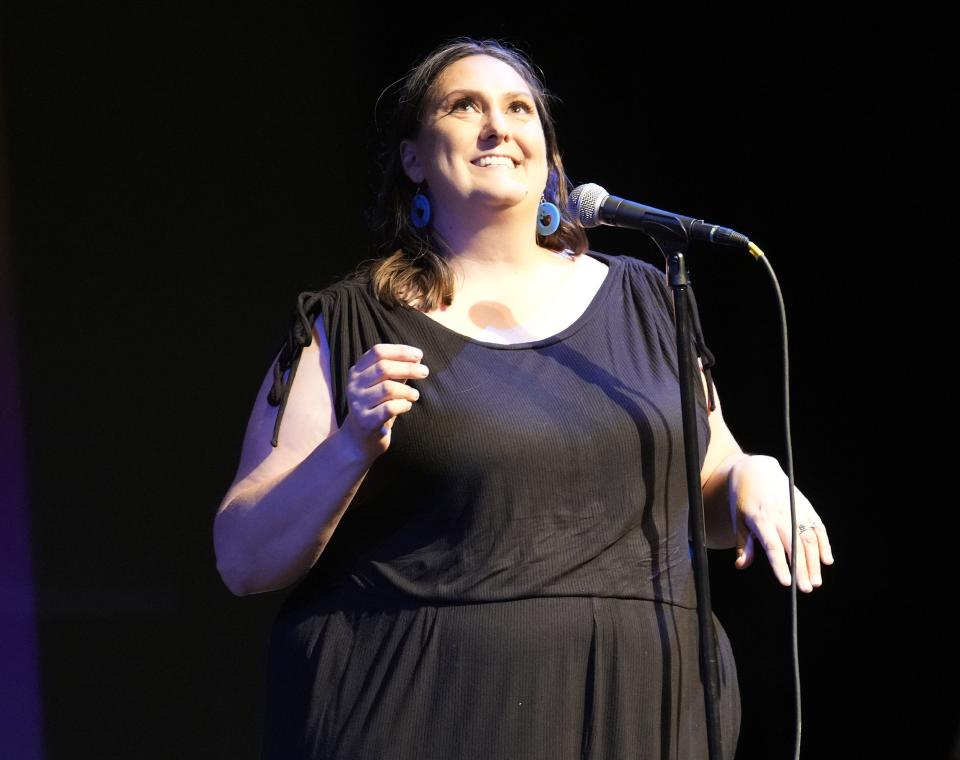
Moore, who had worked as a social worker, had a goal of creating a laundromat where people could do laundry and access services like medical exams, legal advice and connection to job training.
“Customers come in, load their laundry, and we connect them with care,” she said. Social Spin offers workforce development to people who have barriers to employment, like an arrest record, neurodivergence or are experiencing homelessness.
Early in the COVID-19 pandemic, the landlord of one of Social Spin’s locations doubled the rent, Moore said. After deciding not to spend the additional money to renew the lease, Moore established the Social Spin Foundation and bought land about two miles from the previous location. Now, the organization is building a new socially conscious laundromat with “dozens of affordable housing units on top,” she said.
Even for those with the most need, process is long
Connecting vulnerable people with housing can be a months-long process, said Richard Southee, a case manager for Central Arizona Shelter Services.
Southee, who served as a medic in the Army, began working for CASS early in the pandemic, helping people who were in temporary housing, and trying to connect them with a permanent place.
He told a story about how he helped one of his clients, a woman who had experienced lifelong trauma and had been experiencing homelessness for decades.
It took nearly a year to get her into permanent housing, Southee said. He worked with her for seven months to manage some of her needs and prepare her for permanent housing. Then, after identifying a place for her to live, she waited three months more because housing programs can be cumbersome, he said.
“Something I took away from that was how terrible it is that it takes 10 months to house someone who is so vulnerable because others didn’t want to affect their property values,” he said.
Finding Home was the second of three housing-focused events planned by The Republic/azcentral.com around the state this year. The Republic/azcentral.com is partnering with local and statewide groups for the event series. This event series is part of The Republic/azcentral’s coverage of housing insecurity, which is supported with a grant from the Arizona Community Foundation.
Reach the reporter at cvanek@arizonarepublic.com. Follow her on Twitter @CorinaVanek.
Support local journalism. Subscribe to azcentral.com today.
This article originally appeared on Arizona Republic: Republic storytellers tackle affordable housing, homelessness in Valley

